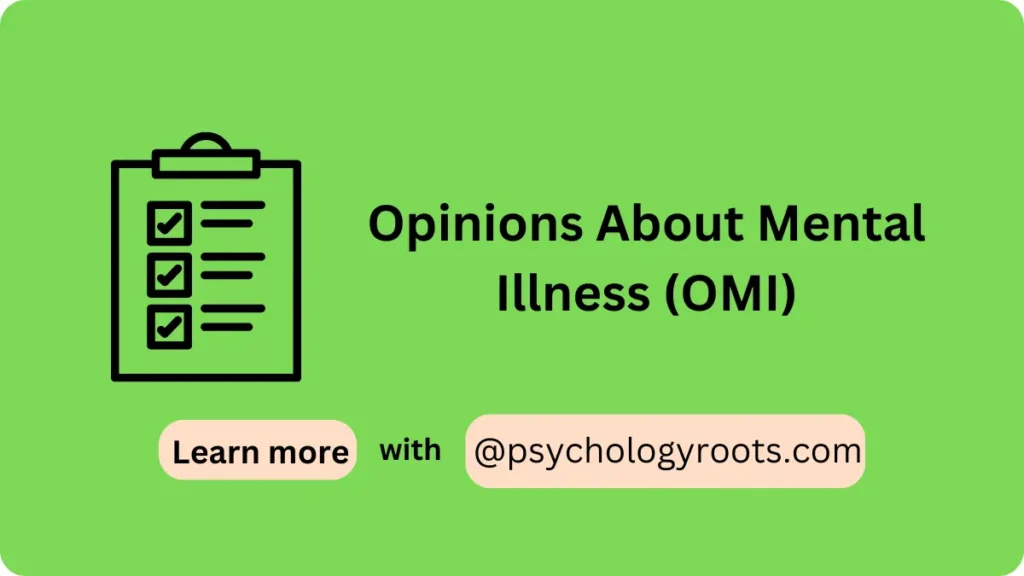Table of Contents
Opinions About Mental Illness (OMI)
Here in this post, we are sharing the “Opinions About Mental Illness (OMI)”. You can read psychometric and Author information. We have thousands of Scales and questionnaires in our collection (See Scales and Questionnaires). You can demand us any scale and questionnaires related to psychology through our community, and we will provide you with a short time. Keep visiting Psychology Roots.
About Opinions About Mental Illness (OMI)
Scale Name
Opinions About Mental Illness (OMI)
Author Details
Dr. Jacob Cohen
Translation Availability
Not Sure

Background/Description
The Opinions About Mental Illness (OMI) scale is a psychological assessment tool developed by Dr. Jacob Cohen in the 1960s to measure societal attitudes and beliefs about mental illness. At a time when mental health stigma was pervasive, the OMI provided a systematic way to quantify public opinions and understand the various dimensions of stigma associated with mental illness. The scale was particularly significant in early mental health research, as it helped to elucidate how cultural, social, and individual factors influence perceptions of mental illness.
The OMI consists of 51 items, each of which respondents rate on a 6-point Likert scale, ranging from “Strongly Agree” to “Strongly Disagree.” These items are grouped into several subscales that reflect different dimensions of attitudes toward mental illness, including authoritarianism, benevolence, mental hygiene ideology, social restrictiveness, and interpersonal etiology. The scale is designed to capture the complexity of opinions about mental illness, from fear and prejudice to empathy and understanding.
One of the key strengths of the OMI is its ability to reveal underlying attitudes that may not be immediately apparent in more direct questioning. For example, while a respondent might outwardly express support for mental health initiatives, their responses on the OMI might reveal latent fears or misconceptions about individuals with mental illnesses. The scale has been used extensively in research to explore changes in public opinion over time, the impact of mental health education programs, and cross-cultural differences in attitudes toward mental illness.
Administration, Scoring and Interpretation
- Participant Selection: Identify individuals or groups whose opinions about mental illness are to be assessed. The OMI can be used with both clinical and non-clinical populations.
- Questionnaire Completion: Participants complete the 51-item questionnaire, responding to each statement based on their personal beliefs and opinions about mental illness. The process typically takes 15-20 minutes.
- Scoring: Each response is scored on a 6-point Likert scale. The scores for each subscale are calculated by summing the relevant items, and an overall score can also be obtained.
- Interpretation: The results are interpreted by a psychologist or researcher, who analyzes the subscale scores to understand the participant’s attitudes across different dimensions. The interpretation can be used to identify areas where stigma is particularly pronounced or where educational interventions may be needed.
Reliability and Validity
The OMI has demonstrated strong psychometric properties, with high reliability and validity across various studies. The internal consistency of the subscales is typically reported as being in the range of 0.70 to 0.85, indicating good reliability. Test-retest reliability is also robust, ensuring consistent results over time.
In terms of validity, the OMI has been shown to correlate well with other measures of attitudes toward mental illness and related constructs, such as social distance scales and measures of empathy. The scale’s construct validity is supported by its ability to distinguish between different attitudinal dimensions, such as authoritarianism versus benevolence, and its predictive validity has been established through research linking OMI scores to behaviors and decisions related to mental health policy and treatment.
Available Versions
Maltiple-Items
Reference
Cohen, J., & Struening, E. L. (1962). Opinions about mental illness in the personnel of two large mental hospitals. The Journal of Abnormal and Social Psychology, 64(5), 349.
Important Link
Scale File:
Frequently Asked Questions
Q: Who can administer the OMI?
A: The OMI can be administered by psychologists, researchers, or mental health professionals who are interested in assessing societal attitudes toward mental illness.
Q: How long does it take to complete the OMI?
A: The OMI typically takes about 15-20 minutes to complete.
Q: What dimensions of attitudes does the OMI assess?
A: The OMI assesses attitudes across several dimensions, including authoritarianism, benevolence, mental hygiene ideology, social restrictiveness, and interpersonal etiology.
Q: Is the OMI still relevant today?
A: Yes, while the OMI was developed in the 1960s, it remains a valuable tool for understanding attitudes toward mental illness, particularly in research on stigma and public perceptions.
Q: Can the OMI be used cross-culturally?
A: Yes, the OMI has been used in various cultural contexts to explore differences in attitudes toward mental illness, though adaptations may be necessary to ensure cultural relevance.
Disclaimer
Please note that Psychology Roots does not have the right to grant permission for the use of any psychological scales or assessments listed on its website. To use any scale or assessment, you must obtain permission directly from the author or translator of the tool. Psychology Roots provides information about various tools and their administration procedures, but it is your responsibility to obtain proper permissions before using any scale or assessment. If you need further information about an author’s contact details, please submit a query to the Psychology Roots team.
Help Us Improve This Article
Have you discovered an inaccuracy? We put out great effort to give accurate and scientifically trustworthy information to our readers. Please notify us if you discover any typographical or grammatical errors.
Make a comment. We acknowledge and appreciate your efforts.
Share With Us
If you have any scale or any material related to psychology kindly share it with us at psychologyroots@gmail.com. We help others on behalf of you.